#even Framework May agrees
Explore tagged Tumblr posts
Text
Simmons: I don't want to be too much of a bother, but could you do me a small favor?
Fitz, Skye/Daisy, Coulson, Bobbi, May: I'd literally die for you, but go on.
#incorrect quotes#aos incorrect quotes#aos#lol#Fitzsimmons#skimmons#Jemma Simmons#pop tart#cinnamon roll#even Framework May agrees
125 notes
·
View notes
Text
Frequently Asked Questions
Hi! I'm mostly on a fandom break right now and consequently am really slow responding to messages, so I figured I'd post answers to some of the questions I receive the most. :)
Snippets and Spoilers can be found here!
***
When will TLE3 be released?
I don't have an exact date, but it probably won't be in 2025. I am giving myself the space and time to write TLE3 at my own pace and pleasure, and I plan to have a full draft finished before I start publishing on AO3. I promise when it's ready, you'll be the first to know.
***
Can I print TLE?
Please do not print TLE using any commercial printing service, as this is not legal (at least in the US, which is where I am). If you are printing and binding it yourself solely for personal use and in a manner that is 100% in compliance with copyright law – aka no one at any point in the process can make any money off of it – then I personally am fine with it (and very honored!). However, I cannot give approval for anything that infringes copyright law in any way. Thank you for understanding! I don't want to be sued!
***
Can I translate/create a podfic/create fanart for TLE?
I would be so unbelievably honored! I give a blanket approval for translations, podfics, and fanart, and I'm so, so touched that you would take the time to do this. I just ask that you ONLY post to AO3* and to please mark it as a related work so it's linked to the original. I may be slow to approve the AO3 email linking the fics, but I promise I will! Thank you!!
*except fanart, obviously. Do whatever you want with that. Although if you post it on tumblr, I would LOVE to see it. <3
***
Are you on any other social media sites?
No. I am ONLY on Tumblr, AO3, and the TLE discord. I don’t even use social media in my personal life, so don't try to find me! I'm not there!
***
Do you have fanfic recommendations?
I’m sorry, but I am not a good resource for this. I haven't actually read much fanfic as I spend most of my limited free time writing it. However, I always recommend checking out @jilyawards for a fantastic collection of the incredible talent in this fandom over the years.
***
Do you take requests for one shots/other fics?
No, sorry. I have my hands more than full with TLE.
***
Do you take suggestions for the plot of TLE?
No, sorry. I have the story pretty tightly plotted from beginning until the (very) end, and while I occasionally swerve down new creative alleys, I’m very committed to sticking to my original plan.
***
Is [super specific spoilery thing] going to happen in TLE?
You are of course welcome to ask, but I am almost certainly going to shout “SPOILERS!” and run away cackling.
***
You say this is a canon fic but [super specific thing that I don’t agree with] is included. What gives?
For the purposes of TLE, ‘canon’ means the original seven books. Everything else is dressing. I do include as canon a lot of the lore JKR provided in interviews while the books were being published (for example, James being a Chaser), however I tend to view all post-book authorial additions as mostly optional. I do use a fair amount of Pottermore in my story, but I do not keep up with new HP material, so it’s impossible to stay up to date with everything. For example, I tweaked the Animagus process somewhat to my liking as opposed to what is described in Pottermore. This is partly because I already had my version sketched out before that was published, and mostly because I did not like what was given on Pottermore.
I do not consider any of the films canon. If this alleged HBO show happens, I will not consider that canon. Video game? Not canon. I also simply do not know what the words ‘Cursed Child’ mean, as I am pretty sure this is from an alternate timeline in which I do not exist. Tra la la. :)
All of this to say: The seven books are the framework. However, I feel pretty strongly that within that framework there is room for many, many interpretations – particularly with regards to the Marauders era, about which we know so little. Just because my headcanon or characterization is different from yours (or vice versa!) doesn’t make it less canon. Similarly, just because something is not explicitly described in the seven books, doesn’t mean it is against canon for it to have happened in the background, unnoticed by Harry, or before the timeline of the seven books starts. See: Wolfstar.
***
Wait, there’s wolfstar in TLE?
Yes. There will be wolfstar in the series. I did tag it from day one, please stop sending me shocked and horrified messages! (lol) Because people have such strong feelings about this ship, I always feel the need to give my little disclaimer: There will be wolfstar. Personally, I love it and am excited to write it. However, if you are a fan of exclusively fluffy, happy wolfstar, you might be disappointed. If you are interested in exploring the fraught, occasionally toxic relationship between two angsty, repressed, and deeply traumatized young men during an escalating war…strap in, gird your loins, etc. We're gonna have some fun.
***
Why do you have two blogs?
Because I'm dumb. Because I didn’t know how tumblr worked when I started this whole nonsense and thought that a side blog sounded like a good idea…aaaaand then pretty much immediately regretted it. This was back before you could reply from a sideblog, so everything was a mess. I'm an archivist at heart, so I can't bring myself to delete @chdarling-tle but I almost exclusively use @chdarling these days. Feel free to only follow that one, unless you only want chapter updates and none of my silly reblogs, in which case @chdarling-tle is here for you. Otherwise it's pretty dead over there.
(ok, confession: this actually isn't a frequently asked question at all, but I shoved it in here anyway because the two blog thing annoys the shit out of me and I wanted to give some context for my disorganization. I meant well, once upon a time!!!)
***
Do you have a Patreon?
I’m amazed and flattered that I’ve been asked this enough to include it in an FAQ, but no, I do not. While I am so appreciative that people want to support this project, TLE is a work of fanfiction, created entirely out of and for love, and is in no way a commercial endeavor. I do not make a penny off of this project. I almost certainly lose pennies to this project. But that's okay! Because of the aforementioned love! And, once again, my deep and enduring desire to not be sued!
***
Ok but seriously when will TLE3 be released?

(sorry I couldn't resist)
175 notes
·
View notes
Text
Summoning Your Secret Boyfriend Pt. 3
This post is dedicated @fanfics-or-dragons who wrote part of the post. I will put their part in bold. I would suggest checking them out, they write some really interesting stuff.
First Previous AU Summary
“Because it is!” Constantine screams, “They literally say ‘hi’ by fighting each other. Not to mention even if they don’t try to purposely hurt you they often do due to how fragile we are compared to them. Even their weakest would be a challenge to our heavy hitters!”
Constatine tried to take a deep breath to calm down. The kids were obviously alive so they obviously haven't pissed anything off too badly over there. If anything they might have gained favor with something from there. "Kids you may have not bungled whatever the hell you got up to but I seriously doubt you understand the ramifications that can happen when you form ANY type of relationship with beings so powerful you can't comprehend it."
Constatine was actually feeling like the sheer dred was fading and that he could handle this, and then Superman had to butt in to defend his kid. "The kids obviously have not been keeping us informed of their actions as much as they should have, and that will be being addressed Supernova. But they obviously have not gotten themselves into too much trouble with how you describe the beings from this realm. And you are one to talk about dangerous relationships with more powerful beings. The team has hardly had the type of relationships you tend to favor."
Which would have been annoying enough if it wasn't followed by the robin kid bursting out laughing and falling to the ground. Looking directly at Supernova, who was suddenly looking at the ground and bursting out into more laughter. He doesn’t get paid enough to deal with this let alone teenagers.
While Constantine was reenacting the scene from the office, Supernova and Red Robin worked on controlling their laughter.
“It was from when Batman was stuck in the time stream,” Red Robin stated through his muffled laughs.
All eyes turned to focus on Red Robin the moment those words came out of his mouth. The mood turned from slightly light hearted to sullen in a moment. Most members looked like they were sucking on a lemon, remembering how they called him crazy for thinking that Batman was alive. The look in their eyes as they agreed that he lost his mind in grief was always in the back of his mind. Reminding him to be careful with who he trusted and how small that number now was. It was why he liked rubbing it in their faces that he was right, no matter how childish the action was.
“The time stream,” Red Robin continued getting up from the floor, “is a part of the realms. Batman being there was causing them a bunch of problems so they were pretty happy to hand him over after we fixed the problems his presence caused.”
“Yeah,” Supernova chimed in, “and one of their citizens that was fixing the disturbances in the time stream talked about the rules and how Batman was breaking them while they helped us hold up our part of the deal.”
Which was partly true. It was mostly Danny complaining about how much trouble the Justice League causes him and with mentions of laws he needs to study up for his coronation. Apparently every new King throws out the previous ruler’s laws and makes new ones. He decided he would instead use old laws as a framework and make them fairer. They spent a lot of time with him working on them so they have the best understanding of the laws now that their boyfriend is King.
Even without mentioning that Constantine turned from his calmer state into looking half-dead again.
“So let me get this straight,” the con man said while he rubbed the bridge of his nose, “For fixing the disturbances in the time stream that Batman caused, they returned him?”
“Yeah.” “Basically.”
“And you never thought to mention that to anyone?!”
To be continued . . .
Next
#danny phantom#dcu#dcxdp#dp + dc#dp x dc crossover#danny fenton#superboy#conner kent#ghost king danny#time zone au#danny fenton x tim drake x conner kent#super dead tired ship#conner kent x tim drake#danny fenton x conner kent#danny fenton x tim drake#red robin#super dead tired#tim drake#john constantine#justice leauge dark#justice league
906 notes
·
View notes
Note
Forgive me if this is a silly question + no pressure to answer it ofc, but what would you 'replace' addiction with when discussing patterns of harmful and compulsive substance use? I agree with your views re: the disease model and its failure to engage with the material contexts in which these behaviours often arise, but I also find addiction a useful concept for talking about my own experiences with substance use (including severe physical dependency). It's a nebulous, imperfect term, but when someone calls themselves a [substance] addict you implicitly understand something of their relationship with that substance. For some the relationship is mutable, whereas for others it's a pattern that repeats throughout their lives; both can claim to have experienced addiction, as far as I'm concerned. But there are certain behaviours and attitudes that are very common amongst self-described addicts, and these commonalities form the basis of many peer support networks. Without the conceptual framework of addiction, would we not be even further isolated?
first of all i disagree that addiction is even a useful shorthand, and i think you actually contradict this notion yourself in this ask. if someone tells me they're an addict, do they mean they're a 12-stepper who views substances as external impositions onto the psyche curable by prayer to protestant god? do they mean they're physically dependent on a substance? that they have been in the past? that they subjectively feel out of control of their substance use? that it's escalating, or has been in the past? that it has cost them jobs or friendships? that it is subjectively enjoyable but exacts health effects they dislike? that they prioritise it over other elements of their life? that they use it as a form of escapism, as a form of self punishment, for some kind of spiritual enlightenment, as pain relief, as a distraction...?
if i care about the answers to these questions then the label addiction means nothing to me. i find out these answers by talking to people and the explanations are simply not summed up by that one word. i have met self-identified addicts with definitions of the term beyond my wildest conceptions & i'm sure i will continue to do so. "it's shorthand" is not factually workable if no one can even define what precisely is ostensibly being shorthanded. so on a basic level, no i actually do not think anything is being semantically sacrificed in challenging the idea of 'addiction' because it's a political dragnet, not a coherent psychological or experiential concept.
second, in a hypothetical world where the behaviour of using substances recreationally isn't pathologised, i don't really care that strongly what people do or don't call it. but i don't live in that world, i live in the one where the idea of 'addiction' is a clinical discourse born of a degeneracy theory discourse intended to produce economically useful citizens by pathologising inebriation. so i not only don't see the value in caping for the term, i actually think continuing to rely on these discourses is actively harmful. incidentally, and not to elevate my personal experience here, but some of the most heinous shit people have ever said to me wrt my own substance use has come from self-identified addicts too. because again, this term is not rooted in some kind of care model but in a political discourse intended to eliminate the behaviours it describes.
this to say: i'm not proposing an alternate name for addiction because i don't think it's actually a useful or liberating term, let alone a coherent description of any one psychological or personal experience. there are specific terms i sometimes use as far as they go: i might talk about physical dependency where applicable, or about feeling compelled to use substances (though i am becoming increasingly disillusioned with notions of 'compulsion' for basically the same reason, i use that term only as a purely subjective description, and frankly i may move off recourse to it at all).
but i don't see that the umbrella term 'addiction' is actually unified by anything except a political logic of attempted discipline & control. if i want to talk to people personally about our experiences using drugs then i already have quite a bit of vocabulary beyond the addiction term that i need & like to use for myself, & i solicit the same from the people i talk to wrt their own experiences & interpretive frameworks. i don't think using the addiction framework is good or even neutral in a politico-moral sense, and its conceptual heterogeneity means it's not even useful philosophically. what it does, and what it exists to do, is obscure the individual into a pathologising discourse intended to correct and punish a deviant behaviour.
101 notes
·
View notes
Text
Redeeming the Law of Attraction: A Believer's Guide to Manifestation in Alignment with God
I receive a lot of questions from you guys regarding how to reconcile the LOA and your faith at the same time. Or whether that's even possible. I fully agree that as a Believer, it can be confusing to navigate the concept of the Law of Attraction (LOA), especially given how closely it mirrors some Biblical principles, yet how deeply it has been distorted by New Age ideologies. While many LOA teachings emphasize personal power, manifestation, and relying on "raising your vibration," the Bible teaches us that all good things come from God (James 1:17) and that He alone is the true source of our abundance, protection, and fulfillment. So how do we reconcile this principle with our faith without veering into pride or idolatry? My opinion is that the answer lies in understanding LOA as a created principle that's part of God's divine order and not a substitute for God Himself.
1. God Is the Source, Not Us
Deuteronomy 8:17–18 gives us a direct warning against self-idolatry: “You may say to yourself, ‘My power and the strength of my hands have produced this wealth for me.’ But remember the Lord your God, for it is he who gives you the ability to produce wealth.” The core issue with many LOA teachings is the belief that we can bring things to pass through our own will or energy, independent of divine grace. But Scripture reminds us that every ability, every blessing, and every outcome we achieve ultimately comes from God.
When we remove God from the equation, we risk elevating ourselves to the place of the Creator. This is the same pride that led to the fall of Lucifer and the rebellion of Israel. We see it played out in the consequences of Israel's disobedience and reliance on their own understanding, leading to exile and suffering (Isaiah 30:1–2; Hosea 4:6).
2. Pride Destroys, Alignment Protects
Manifestation without humility is a spiritual trap. The more we insist on controlling outcomes, the further we drift from the protection that comes through surrender to God. Proverbs 16:18 says, “Pride goes before destruction, a haughty spirit before a fall.” Even when we are pursuing good things, if we do so without seeking God, we step out of alignment with His covering.
In the New Age framework, the LOA often becomes a form of self-worship. But for the Believer, true manifestation is not about making ourselves gods, but about aligning with the will and timing of the one true God. The difference is critical. God’s protection, insight, and timing are what shield us from attracting things that may look good but ultimately destroy us.
3. We Are Co-Creators, Not Sovereigns
The Bible tells us in Psalm 82:6, “You are gods; you are all sons of the Most High.” This doesn’t mean we are divine in the same sense as God, but that we are made in His image (Genesis 1:26–27), given creative power through our words, thoughts, and actions. Proverbs 18:21 says, “Death and life are in the power of the tongue,” and Jesus Himself said, “Whatever you ask in prayer, believe that you have received it, and it will be yours” (Mark 11:24).
We are, in a sense, spiritual creators—but under divine authority. The moment we see ourselves as sovereign over our lives without God’s governance, we step into dangerous territory. We may manifest what we think we want, but without discernment, we often call in things rooted in trauma, pride, lust, or broken ambition.
4. The LOA Is Real, but Fulfillment Comes from God
We should not deny that there is truth to the Law of Attraction. Our thoughts, emotions, and spoken words have power. But that doesn’t mean we are the ultimate power. God created the universe to operate on spiritual principles: sowing and reaping (Galatians 6:7), asking and receiving (Matthew 7:7), faith and expectation (Hebrews 11:1).
Non-believers can and do use these principles to gain success. But without God’s direction, success can become a snare. People can attract toxic relationships, wealth that isolates, or fame that destroys. Only the Lord gives true fulfillment. Proverbs 10:22 reminds us, “The blessing of the Lord makes rich, and he adds no sorrow with it.”
5. Faith = Surrender + Expectation
Where LOA emphasizes belief in self, biblical faith emphasizes belief in God. Psalm 37:4 says, “Delight yourself in the Lord, and He will give you the desires of your heart.” This isn’t a mere transaction; it’s also a transformation. As we align our heart with God, He plants His desires in us, but also delights in giving us the things we've longed for that are for our good.
Prayer and faith are not passive, they are bold, expectant, and active. Yet, they are also surrendered. We ask in full belief (James 1:6), but trust that if something doesn’t manifest, God has something better, or is protecting us from something we cannot yet understand. Romans 8:28 assures us, “And we know that in all things God works for the good of those who love him, who have been called according to his purpose.”
Final Reflection: Manifestation Under Lordship
Ultimately, the Law of Attraction is not a rival to God; it is simply one of the many principles He put in place to govern His creation. Like gravity, it works. But like any tool, it can be used righteously or destructively.
When we manifest under God’s Lordship:
We invite the Holy Spirit to shape our desires.
We allow God to filter our intentions.
We steward our thoughts, words, and energy in a way that honors Him.
We relinquish the outcome to His perfect will (to prosper us and not harm us, to give us hope and a future, Jeremiah 29:11).
We are not victims of randomness, nor are we gods unto ourselves. We are image-bearers of the Creator invited to co-create with Him in trust, humility, and alignment.
So yes, believe. Visualize. Speak life. Walk in expectation. But do it all from a place of surrender, knowing that the One who holds the universe also holds you, and He has the final say and that is a privilege for you! Because in the same way a loving parent would never allowed their children to blindly get harmful things due to lack of understanding, neither does He want us to suffer because we aren't fully aware of the negative outcomes that some of our selfish manifestations may carry with them. God is not an authoritarian figure, but a protective and loving one. Remember that.

88 notes
·
View notes
Text
the way that some people talk about jason and batman and the joker is so jarring to me because it relies on some unspoken assumptions that i will never buy into
1. the assumption that taking a life inevitably always makes the person who did it worse. killing someone isn’t always this earth shattering thing that harms the person who does it and fundamentally changes their outlook on things. i guess if you have never met a veteran or someone who survived an armed robbery or any number of other things you might make that mistake, but like some of the people who fought in wwii came home and were normal members of the community and the times that their bullets hit the mark were not necessarily the parts of the war that kept them up at night. these assumptions that once you kill you are wicked and have to feel bad and do this whole show of repentance are insidious. if you are gonna look at all this through the lens of christian morality you should at least be aware that that is what you are doing but you cant have just one character be wicked and unclean because of his actions when the bible says that everyone is wicked and unclean by our nature and all sins are equal. a lot of people object to that view but if thats how you see it batman and jason and the joker are all sinners and are all as bad as each other so at least be consistant about how you apply that moral framework.
2. the assumption that being robin or being taken in and trained by bruce means full agreement with and acceptance of every part of bruce’s personal philosophy on justice and morality. jason was a homeless child and even if all this was explicitly laid out for him he could not have agreed since he needed bruce as a matter of survival. bruce’s ideology is extremely important to him and he can teach it to his children all he wants but they are not beholden to it above all else the way he thinks they should be. jason has to live according to his own beliefs regardless of how unacceptable bruce finds it and it is unfair and hypocritical of bruce to get bent out of shape about it.
3. the assumption that killing is always bad. maybe i have listened to too many episodes of behind the bastards but some people will do significant and appalling damage to others no matter what unless they are dead. those people can’t be allowed to keep causing harm. it isn’t glorious and there is no honor about it but it is right and just that they be stopped. there is no reason to strive for purity or ideological high ground when you can provide a measure of safety and justice to victims and prevent future harm instead.
4. the assumption that bruce didn’t have to answer to jason. parents have a duty to their children and it is my opinion that that duty does not end when the child dies. bruce adopted jason and made himself responsible and accountable for everything that happened to jason under his care. that responsibility was ignored over many instances. i am not going to detail the things that led to jason’s death here but it was not good or effective parenting. after jason’s death the disrespect starts pretty immediately with bruce compromising evidence of his murder in order to preserve his ability to continue as batman and continues with bruce getting rid of pretty much all traces of jason’s presence in his life. he is only spoken of as a mistake, a lost cause, or a cautionary tale and is assigned blame for his own death, a death that batman never bothered to fully investigate since he was buried next to the woman who led him into the trap. a new kid is endangered and the joker and batman both continue doing whatever they want as if jason’s life only matters for the way it affects them. bruce needs to answer for all of this, as his son jason has a right to expect more from his father. now the extent to which that extends can be debated but it is clear to me that jason deserved better from bruce.
conclusion: killing is accepted in society in certain circumstances, you may or may not agree with this but self defense laws and even things like jury nullification exist because people knew there should be some wiggle room since no one could have the full context of every situation that would ever arise. ending a life is not normal or ideal but it is not an unfathomably rare experience and it does not always weigh on the person who does it. bruce has never to my knowledge killed someone so he has no idea how he would actually respond but that still isn’t even what jason was asking him to do. all he had to do was be present and not move and he would have been the only parental figure who didn’t let jason down.
#i wish christianity didn’t teach people that sin ruins you forever#for many reasons#but right now im frustrated that it keeps coming up in supposedly secular places#hopefully someone gets what im trying to say#jason todd#anti bruce wayne#under the red hood
271 notes
·
View notes
Text
God, since the whole “bear vs man” thing came up again
Everything I’ve seen said in defence of using this as a framework to mean something has always relied on a cherry picking of stats and broad application of those to serve bio- and/or gender-essentialism.
The question is meant to be a direct reference to the fact that there were women hikers on TikTok actively stating that in their experience they end up more afraid coming across a man than a bear because if the bear were to attack at least people would believe that.
Great—same if a woman attacked you in the woods. You’d probably actually be believed more if your story is assault by a man than assault by a woman, even though I’d definitely agree that assault by bear would be believed more readily than either.
But men are more statistically likely to commit violent crime! So actually it makes sense that people would be more afraid to meet a man over a bear instead of a woman over a bear!
And people close to you are more statistically likely to commit violent crimes against you than strangers are, and yet I’m not seeing people out here using that statistic to demonize the idea of close friends going hiking together by-way-of “would you rather go hiking in a remote area alone and come across a bear or would you rather trade-off that bear encounter with a having gone with a friend?” Even though you’re even more likely to be violently assaulted by someone you know than some random man you encounter, so you’d think that the same people wanting to enforce fear of being in remote areas with strange men would want to enforce fear of being in remote areas with those you’re close with.
The thing is, what they’re doing is reinforcing their own bio/gender-essentialism (or sometimes reinforcing a trauma response, or both at once, but I’m specifically talking about the bio/gender-essentialism in this post (and also reinforcing stranger danger stuff they may have internalized but that’s even further digression)), as I said, by cherry picking which statistics they’re using to speak about the dangers of existing in the world.
And this isn’t even getting into how many other unstated assumptions are going on in the reading of the question and subsequent answer of it—just to quickly point out one: the assumption that we’re dealing with a potentially malicious man pops up very quickly in a lot of discussions, but I don’t often see people making similar assumption of the bear they’re considering being a bear that is more likely to aggress at you than the average bear (for example, by you unknowingly being between a mother bear and her cubs, by the bear being seriously ill or injured…)
But yeah, anyway, all of this to say that the “man vs bear” thing serves no utility beyond maybe dissecting the question further to see in what other ways we as people will create new ways to serve up the same bio-/gender-essentialism.
166 notes
·
View notes
Note
I’m a transfem Christian, and sometimes I worry that I’m twisting Christianity to suit my politics and views rather than the reverse. I was raised as a Southern Baptist and left for the Episcopal Church, with the conservatism of the former church being a large reason for my departure. I really don’t want to have to chose between either being able to transition and being a good Christian, but I’m so worried that I’ll have to make that choice.
Hey there, I am so sorry for the delay in responding to this. I don't for a second believe you are "twisting" Christianity to suit your views by living into your true self:
Jesus tells us that we can know a thing by its fruit — if the fruit is good, the tree is good; if the fruit is bad, the tree is bad (Luke 6:43-45; Matthew 7:15-20).
What are the fruits of transition? Joy, community, reconnection with your own body? Life?
What are the fruits of the things preached by ultra conservative churches? Hatred, fear of difference, violence? Deportation instead of love of stranger, judgment instead of mercy, control via terror instead of liberation through God's love?
Near the end of this webpage of mine about a liberatory framework for reading scripture, I address the accusation that queer Christians are just "reading into" the Bible what we want to see. To sum it up, I agree that all people bring our biases to the text — heck, the biblical authors brought their own biases to the text!
“The truth is, you can bend Scripture to say just about anything you want it to say. You can bend it until it breaks. For those who count the Bible as sacred, interpretation is not a matter of whether to pick and choose, but how to pick and choose. We’re all selective. We all wrestle with how to interpret and apply the Bible in our lives. We all go to the text looking for something, and we all have a tendency to find it." - Rachel Held Evans
Many theologians say that when we accept both our own biases and the biases of the people who wrote, edited, and compiled the books of the Bible, the best way to determine what is Divine in scripture is to follow The Rule of Love:
"Any interpretation of scripture is wrong that shows indifference or contempt for any individual or group inside or outside the church. All right interpretations reflect the love of God...for all kinds of people everywhere, everyone included and no one excluded.”
- Shirley Guthrie
The webpage offers more details about this way of reading the Bible, if you are interested. But at the end of the day, the main thing I hope you can come to believe not only in your head but in your heart and your body is that you are beloved. That God created you exactly as you are with purpose and delight. That you have vital gifts to share with the world that the Body of Christ is not whole without.
If you need further assurance through theology, I invite you to check out Austen Hartke's Transgender and Christian YouTube series.
You may also find Rev. Nicole Garcia's story encouraging; she's a trans pastor who once said that she has experienced two vocations in life: one to ordained ministry, and one to being a woman.
God is calling you, too. I pray that you can feel Their presence and love in your life -- even when it's hard to believe in it yourself. <3
(For more, I have a trans tag and an affirmation tag and trans women tag and also an FAQ you might like to peruse through)
119 notes
·
View notes
Text
IS IT POSSIBLE TO STOP TIME??
Blog#437
Wednesday, September 18th, 2024.
Welcome back,
If you've ever watched an ice cube melt or stirred creamer into a pool of black coffee, you've witnessed a fundamental truth about the universe: The "arrow of time" always marches forward.
Time flows from past to future. What we call the present is a never-ending series of inflection points, where the collection of events that have already happened (the past) meets the collection of events that have yet to happen (the future). And while time doesn’t ever stop, it can slow down.

Einstein’s theory of special relativity gave us a completely new way to view the cosmos. Prior to Einstein, we had movement through space, and we had passage through time. Special relativity unties those theories into a single, unified framework called spacetime. In this new framework, it’s impossible to move through space or time separately; instead, every object in the universe is constantly moving through both simultaneously.

This means that it’s (theoretically) possible to slow down your progression into the future. The faster you move in space, the slower you move in time. So if you jump on a rocket ship and accelerate yourself to 99% of the speed of light, you’ll travel through time about 7 times slower than stationary observers. (Actually reaching that velocity, however, is another matter entirely.)
There’s a caveat here, though: You will never experience this time dilation yourself — your heart will beat at the same rate; your hairs will grey after the same amount of time; and your wristwatch will tick at the same speed as always.

But outside observers looking in will see you move and live in slow motion, seven times slower than they are.
It sounds like a contradiction, but this is what puts the relative in the special theory of relativity: Our perceptions of distance and time depend on our perspective, and no two observers are ever guaranteed to agree.
Relativity allows you to (again, theoretically) skip forward into the future, as well. If you travel fast enough, what may only be a handful of years to you can translate to hundreds, thousands, or even millions of years for everybody else.

By the time you came back to the Earth, it, or the people inhabiting it, could be completely unrecognizable — a major conceit in (spoiler alert) sci-fi films like Planet of the Apes and Interstellar.
Still, no matter what, you can’t stop time, because it's not possible to travel at 100% the speed of light. You’ll always move a tiny fraction below that ultimate speed limit, and so you’ll always experience at least some progression of time.

As for time ending, as far as we can tell time will have no end in the future. Our universe is expanding every day, and it appears that it will continue to do so for eternity. The future is wide open, and there will always be another tomorrow. Sure, in the far far future, all the stuff in our universe will be spread out to incomprehensibly thin dust, but time still won’t come to an end.
However, by the same token, it appears as if time does have a beginning. Our universe is expanding, which means that in the past it was smaller. In the distant past, billions of years ago, it was much smaller. In the extremely distant past, around 13.77 billion years ago, our universe was the size of a peach.

Beyond that point, all of our physics knowledge says that the universe started out in such a tiny space that it was a singularity, a point of infinite density. Strictly speaking, that’s also a point where time and space originate, meaning that time has an endpoint in our own past.
Nonetheless, our knowledge of the extremely early universe is rather hazy; we don’t really know what’s going on in those earliest moments, so we can’t say much about it with anything resembling confidence.
Originally published on https://www.discovermagazine.com
COMING UP!!
(Saturday, September 21st, 2024)
"WHAT HAPPENS TO A HUMAN BODY IN SPACE??"
#astronomy#outer space#alternate universe#astrophysics#universe#spacecraft#white universe#space#parallel universe#astrophotography
95 notes
·
View notes
Note
Before we get too into memes about Luigi obtaining work detail status, I just want to remind people of this:
Prison labor is the only form of salvery that is still constitutional in the US. This doesn’t mean it’s the only legal form, just that it’s the only form slavery that our constitution protects (yes, the word they use is “protects”). This is abysmal legal framework when you look into the criminal justice/sociological side of the prison system and realize how disproportionately black people/poc generally are targeted by police and, in turn, incarcerated by our courts and thrown into prisons. It should be emberassing for our country. This is a foundationally corrupt country (specifically speaking of the criminal justice system) that has managed to maintain largely race-based slavery on a larger scale than any other country in the world. And all while managing to keep a large amount of prisons privately funded. (I implore you to look into the sources of this funding and get back to me - it’s horrifying).
While maintaining normality and forms of structure in incarceration is important to giving prisoners normality and a chance at reintegration into the “outside world”, it’s clear what the pretext of it all is. Work detail is seen as a privilege when it is truly a further means of control and a way to avoid the cost of maintaining such a corrupt and robust prison system. If it was truly a mechanism of the structure for prisoners, the majority of jobs would be more valuable than janitorial and maintenance duties, all for less than a dollar an hour.
It’s also important to acknowledge that Luigi is a wealthy, handsome (hot), educated, and WHITE man, which is a huge part of why his case has attracted so much attention and support. And why he probably will fend much, much better in the prison system than most others. No other politically charged cases in the last 10 years have been followed so closely for so long. And it’s clear that Luigi (allegedly) wanted people to educate themselves on systematic issues.
I know this isn’t really about Luigi and I rarely hop on anon, but I’m largely invested in this case because of its potential for systematic reform and I just saw this as an opportunity to educate people who may not be informed! I haven’t seen anything horrible on tumblr on the subject (love my tumblr bbys), but I also haven’t seen many people talking about this and I just think these reminders are important.
Anon, I greatly appreciate you for shedding light and bringing attention to all the points you made clear, bc I genuinely couldn’t agree more with everything you said. To be honest, I don’t even know what else to add, bc you solidified so many important things so well here, but I wholeheartedly agree with absolutely everything you said here 🤍
28 notes
·
View notes
Note
"if copyright abolition were seriously something that would benefit the rich you could bet there would be an international campaign promoted by the richest people alive trying to get governments to overturn copyright law." This is literally what Sam Altman and every other Silicon Valley company in the AI business has been lobbying to have happen for years. The bourgeoisie may have some common class goals, but even then they are still in conflcit with each other in terms of material interests. A business that benefits from stronger IP protections will lobby for them, but one that would materially benefit from weakened IP laws will lobby for that instead. This doesn't mean that either position is Inherently Bourgeois, it simply means that some members of the bourgeoisie have material interests that conflict with the ones that others in their class have.
I agree that it was too much of a sweeping statement and that it is in fact possible for the bourgeoisie to have conflicting goals within their class. I am however a bit skeptical of any claims that Sam Altman is a copyright abolitionist: it has in the past been widely publicized that he said during a court hearing that ChatGPT couldn't exist unless it has access to copyrighted works, and has lobbied the US government to classify the use of copyrighted materials for training AI models as fair use. All within the currently existing framework of copyright law.
And that's actually something that has yet to be established in law to my understanding: whether the use of copyrighted materials in AI training could be seen as fair use.
But yeah, it does go to show that there are conflicts within the bourgeoisie as to how copyright law should be applied, with copyright holders often wishing for stricter interpretations of the law while those working in technology currently striving for looser interpretations of the law. I do admit that my original statement was far too sweeping, but even with the caveat that there exist conflicts within the bourgeoisie as to the exact interpretation of copyright law, copyright law as it exists currently does favor large corporations to a disproportionate extent (often at the expense of creators).
52 notes
·
View notes
Note
2/?
Kaveh and Alhaitham make sense, emotionality is indeed closely associated in Western culture with femininity, and low emotion and rationality with masculinity. In the eastern culture to which both characters belong, such patterns do not play a special role, and therefore this part of the fandom may perceive characters and their interaction differently, through the prism of other views (which becomes noticeable if you choose other languages on ao3 and look at the ratio of top/bottom tags). But it cannot be denied that the game is aimed at a wide audience, not just those players who are close to the culture and traditions of a particular region, and the creators understood how the Western audience sees the emotional presentation of the characters. But even here there are many intra-fandom distortions and the desire to make an "ideal" heteronormative pair out of them, which are not conditioned by the canon.
As for the parallels between Kaveh and his mother, no less parallels were drawn between him and his father, it's just that the fandom focused only on what he was interested in, presenting the situation as if he looked like his mother and not like his father, because they wanted to associate him with a feminine figure, not a masculine one. At the same time, Sachin said that Kaveh reminded him of the man he once knew (his father), but he (Kaveh) was made of more durable material. In the picture from the meeting with friends, he practically repeats his father's pose from an old drawing, and it is also clear that they are similar in appearance. In character, if not closer to his father, then at least he has no less traits from him than from his mother. His mother was described as rather withdrawn, unsociable, and focused primarily on work, while his father was altruistic, open-minded, somewhat naive and idealistic, and willing to help everyone, which ultimately led to his death. Even his desire to help Kaveh's mother was in key ways different from Alhaitham's motivations, because he was basically described as a man who primarily sought to help people, rather than "understand" them. That is, the interpretation of Kaveh's resemblance to his mother as emphasizing his "femininity" is primarily the view of fandom, distorted by the desire to fit the character into a heteronormative framework, intentionally emphasizing one part of the information and ignoring another part of it. If we look at the whole context, he was described as the son of his parents, who inherited traits and talents from both of them.
In terms of appearance, Alhaitham, while indeed "inexplicably ripped", is also more sexualized than Kaveh, and fandom often tries to "turn it around" by dressing Kaveh in tight and provocative clothes, and Alhaitham in loose and practical ones, but this does not correspond to the canon.
Sincere passion, especially in relation to one's work, is in principle not a stereotypically feminine trait, it is associated more with the archetype of yang than yin. Gentleness and tenderness or deliberate theatricality are considered feminine, but none of this is typical of Kaveh in the canon.
When paired with Kaeya and Diluc, Diluc is more stereotypically masculine in appearance, character, and behavior, but at least early on, he was often portrayed as smaller, shorter, and more outwardly cute than Kaeya, which shaped the tastes of a certain part of the fandom.
Sampo and Gepard, also a very popular couple, are not oriented towards a heteronormative pattern, and each of them exhibits different qualities.
-----------------------------------
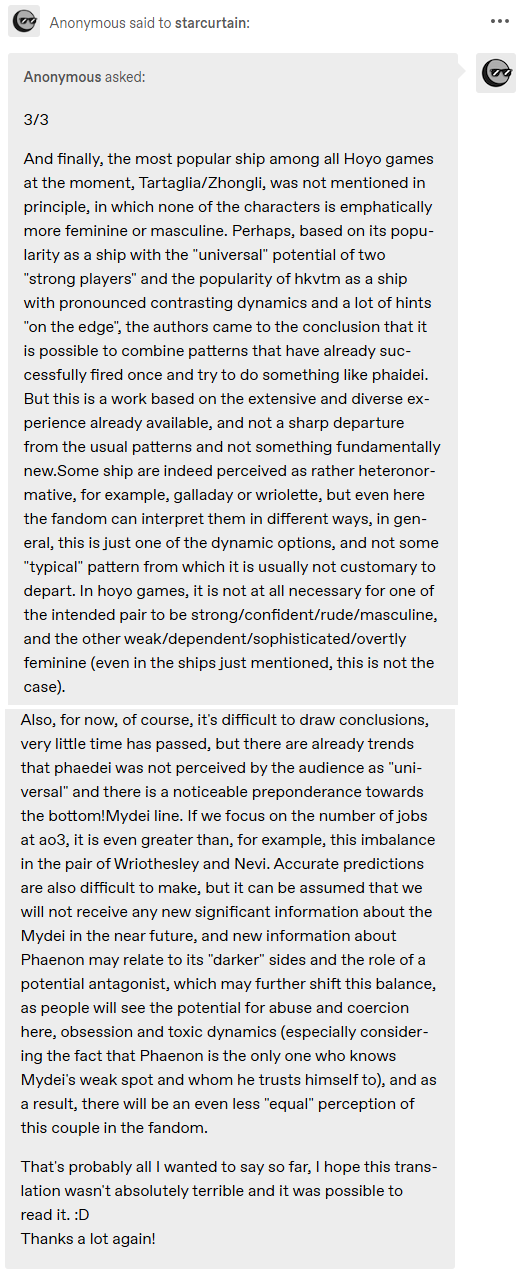
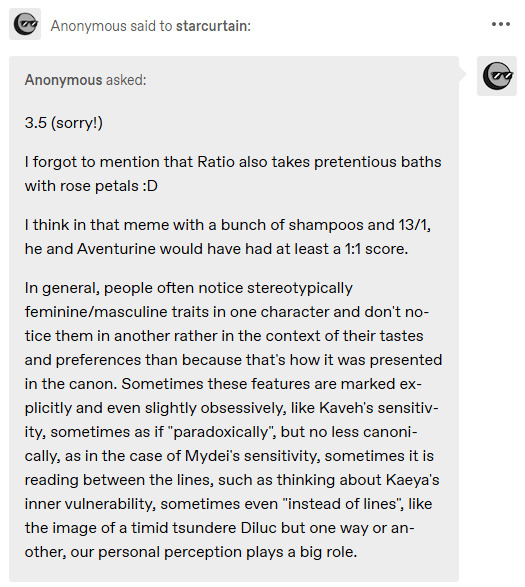
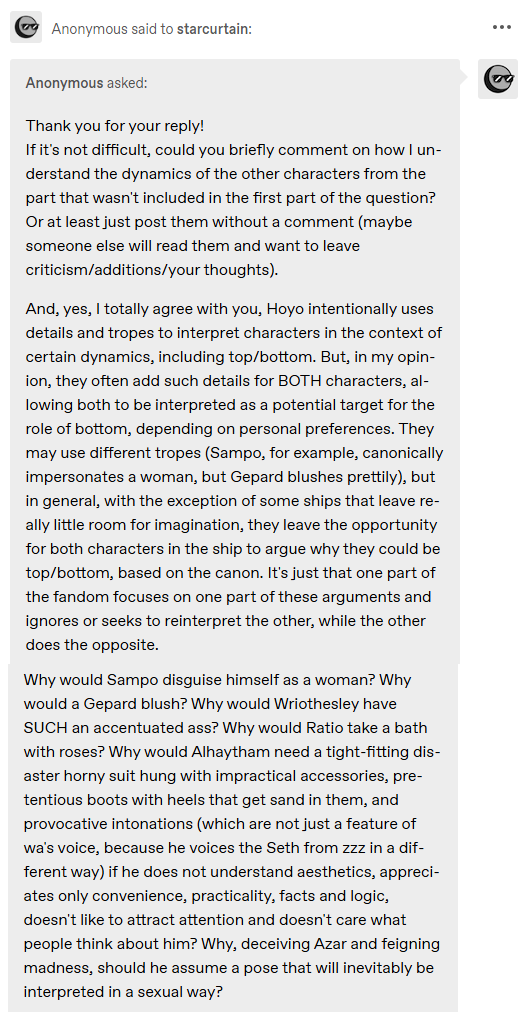

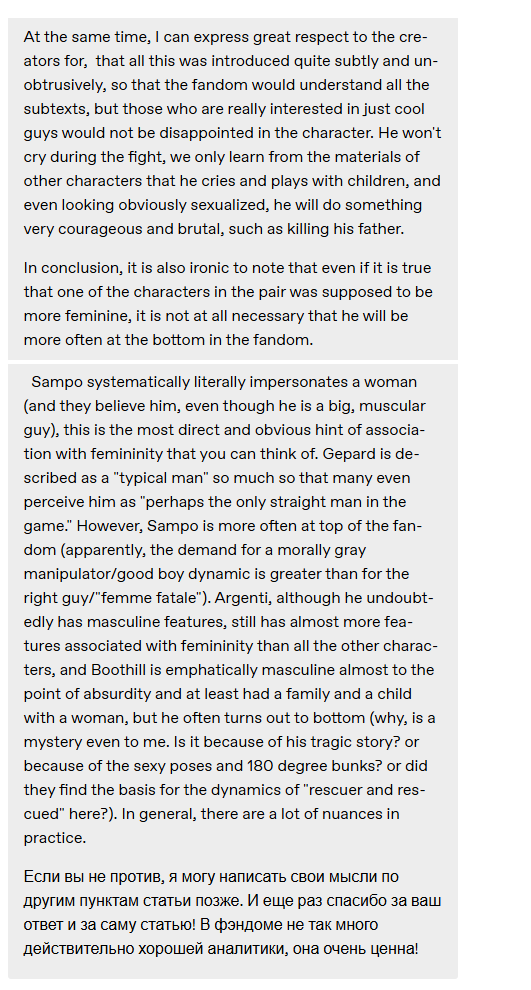
I think your takes on many of the characters are very fair, and you have a good understanding of the characterizations that aligns well in many cases with how I personally understand the characters too!
The fundamental discrepancy in our thinking about this seems to boil down to whether or not you see fandoms as perceptive enough to choose the "preponderance of evidence."
I completely agree with your point that both male characters in Hoyo's ships often have masculine and feminine traits. Each character Hoyo creates definitely is three-dimensional, with a blend of interesting and oftentimes conflicting personality elements.
So I'm not trying to say "This character has all the masculine traits and this one has all the feminine traits" at all. Instead, I think fans overall are making their judgments--and applying their heteronormative lenses--based on the criteria: "Which one of these two male characters is more feminine than the other?"
Of course, as you note, what is considered masculine and feminine varies significantly by culture, which accounts for regional differences in shipping preferences, but I think in most cases, Hoyo has a clear pattern of giving one character a greater overall number of feminine traits than the other in their MLM ships, allowing for a pretty standard level of heteronormativity.
It's not "Alhaitham has no feminine traits." It's "Kaveh just has more feminine traits than Alhaitham," in essence. I believe that, for the most part, fandoms predictably label their top/bottom (or husband/wife) dynamics based on that central criteria--who is more feminine. (It's also why Phaidei is more popular than Myphai--Mydei just was given more feminine traits by the devs than Phainon was. That doesn't mean Phainon has no feminine traits--his sweet-hearted friendliness comes to mind easily--just that he has fewer feminine traits than Mydei, and therefore gets stereotyped into the "wife" role less often by the fandom.)
Going through some of the examples you mentioned:
Kaveh definitely is projected on his father as well as his mother, you're right. The entire Parade of Providence event was about us coming to understand how similar Kaveh is to his father. But this parallel is matched equally by his parallel to his mother in his hangout. If we're keeping a tally of "feminine versus masculine traits," being compared to a masculine parent and then compared to a feminine parent basically cancels each other out. 😂 Simultaneously though, Kaveh is given other traits stereotypically assigned to men as well: He's an alcoholic. He has a quick temper. He's a STEM major lol. Despite being incredibly kind-hearted, he can't read the room well and doesn't actually have good emotional awareness, often failing to understand the feelings of others until they're spelled out to him.
However, he still has (in total) more stereotypically feminine traits than Alhaitham, and that's what counts for the fandom's purposes. He's "pretty"--long-haired with braids, cute hairclips to pin his wispy hair down like a schoolgirl--wears significantly more jewelry than Alhaitham, cares about aesthetics and "beauty," has a more delicate-looking frame, etc. etc. His emotional outbursts at Alhaitham intentionally make him come across like a nagging wife, especially when he makes demands about their furniture, and his character stories confirm that he essentially does all the housework (although it finally seems like Alhaitham is picking up the slack a little more recently, if his birthday media was anything to go by). Kaveh operates on principles of kindness that come not from a patriarchal sense that he is wiser than others, but from the more traditionally feminine self-sacrificial brand of generosity. You mentioned "deliberate theatricality," and while I don't think Kaveh's is deliberate, I do think Kaveh's "accidental theatricality"--shouting, sighing, falling into despair over the slightest setbacks--is definitely coded as a more feminine approach to life (i.e. "hysteria") than the traditional stoicism expected of masculinity. More than any of that though, the narrative puts him into a rescued-princess role because he literally was "saved" by Alhaitham.
So no, it's not that Kaveh is the most feminine character ever; it's just that he's more feminine than Alhaitham.
Regarding Kaeya and Diluc, I'm not sure I can speak, because I don't personally ship it, so I don't have the greatest awareness of the dynamics the fans of that ship prefer. However, my thought is that this ship's statistics might be more profoundly impacted by culture than other ships--in particular, I get the sense that Kaeluc is much more popular in eastern countries than western ones, which definitely impacts what is considered "masculine" versus "feminine." I'm not from an Asiatic country, so I can't speak with any degree of expertise, but one of my guesses would be that Diluc's aggressiveness runs contrary to some expectations of masculinity in eastern countries, where there may be a greater sense that an ideal man should better control himself and mask his grief, marking Kaeya's outwardly stoic response and ability to hide his vulnerability as the more masculine personality.
Frankly, the reason I didn't touch ZhongChi is because, despite the fact that I love it, I actually think the devs regretted their decision to originally begin baiting that ship and have since hit the brakes hard. We haven't gotten a single sliver of new in-game content for ZhongChi since the end of Liyue's archon quest, not even a passing cameo of them together. Compare this to Alhaitham and Kaveh who are still getting new content even though Sumeru's plot has been done for two years now and I feel like you'll see what I mean. I think the devs realized they were playing with fire using a figure symbolic of China itself in MLM ship tease, and they walked back to avoid any repercussions.
Personally, I feel ZhongChi's popularity really has little to do with the game itself and much more to do with a confluence of outside factors (it was the first "tall male" MLM ship in Genshin Impact that wasn't colored by the whole "brothers" situation, giving it huge appeal not just for the eastern audiences but much more so with the western audiences; basically, part of ZhongChi's popularity is that it was just "Not Diluc/Kaeya" lol). I love this ship a lot myself, but I'm not sure ZhongChi is a good example of Hoyo's intentions, given that it seems like they really regret ever going down that path in the first place.
(I think ZhongChi may also be another ship heavily impacted by cultural differences--it might be interesting to examine whether fans perceive Tartaglia or Zhongli as the "top" more often by their specific country; my thought is that Zhongli's particular brand of elegant maturity and outward "emotionlessness" marks him as especially masculine in eastern countries, while Tartaglia's aggressiveness and bold behavior come across as more masculine in western countries.)
Regarding some of your other points, re: Ratio's bath and Alhaitham's tight-fitting clothes, I don't mean to sound rude at all, but this feels like a slight misread to me. Ratio's scenes in his bathtub and Alhaitham's tight-fitting clothes aren't intended to feminize these characters--they're being sexualized foremost for women, not men!
This:

Is the exact same thing as this:

Kafka isn't "masculine" when she is sexualized to appeal to men, right? So I promise, Ratio isn't "feminine" when he is sexualized to appeal to women.
Same thing with Alhaitham's tight clothes. When Alhaitham shows up in artworks looking like this:
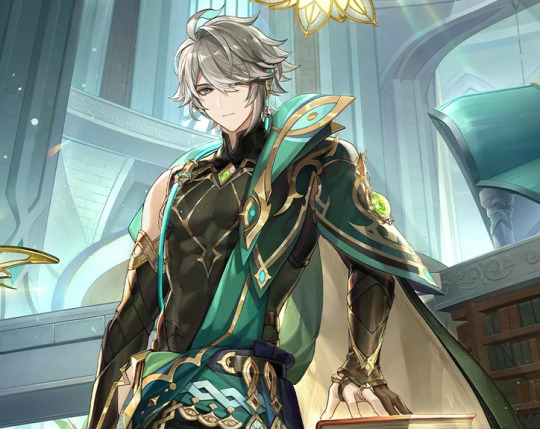
You're not supposed to see him as feminine for the mere act of being sexualized--he's being sexualized for the female gaze. He's drawn this way to highlight his masculinity (abs, pecs, etc.), rather than diminish it, in an effort to appeal to female players. It just so happens this works on lots of bi and gay men too, but women are the primary audience here, and this kind of skin-tight design asserts, rather than dismisses, masculinity.
(By the way, not saying Ratio and Alhaitham don't have feminine traits, because they do! I just don't think the moments where they are sexualized for the female gaze are good examples of those.)
Regarding Sampo and Gepard, I think you have valid points that neither of them particularly conforms to heteronormative standards, but I also get the sense that Sampard was baited mostly through missable moments (I think Sampo's voiceline is probably the most overt tease for this ship?) and then it was really not emphasized much further by the devs--like a "Isn't this funny?" kind of thing, rather than getting a full-blown Alhaitham/Kaveh or Mydei/Phainon treatment. I think the objective was just different between Sampard and ships like Phaidei/Haikaveh; it seems less about selling the characters and more about just adding a bit of flavor to Belobog overall. (I'm so sorry to say it, but Gepard in particular is veryyy boring if you take the potential of a forbidden romance out of the picture; then again, maybe that's just me lol.)
Regarding your points about Sampo's cross-dressing, though, I actually think there may be another factor at play here:
Sampo is a trickster archetype character (i.e. Loki, Puck, or the Cheshire Cat). He's part of the Masked Fools, obviously, but more than that, he exhibits all the classic traits of trickster characters:
He is of ambiguous morality, helping us sometimes and opposing us in others
He is unpredictable and a "situation inverter"--when things are going bad, he appears to solve an otherwise unsolvable plot problem; when things are going well, he shows up to cause trouble
He's a comedic character who nevertheless has obvious hidden depths--he knows things he shouldn't
He's a thief and a conman, but also portrayed as having soft spots and helping those in need (think Robin Hood)
One of the key aspects of trickster archetype characters, however, is that they push boundaries, refusing to be confined to one side (neither good nor bad, neither kind nor cruel). Sampo is both literally a boundary pusher--he can cross the otherwise uncrossable seal between Belobog's underworld and overworld--and also a figurative boundary crosser--how much is Trailblazer willing to put up with him?
But one of the most important boundaries that trickster characters cross is gender. One of the most common traits of trickster archetype characters is cross-dressing or even complete shape-shifting to take the form of the opposite gender (think fox spirits shape-shifting into brides, Loki shape-shifting into a mare, etc.). Sampo's cross-dressing is perfectly explicable if you approach it from the context that he's representing an archetype of characters for whom the physical form is a tool of the trade rather than a central aspect of identity. Sampo's appearance, even down to Sampo's gender, is a facade, in essence.
There's a bigger conversation to be had about trickster archetype characters here and their portrayals in Christianized traditions versus non-Christianized traditions, but one of the other common traits of tricksters is that they are overwhelmingly male. (There are also female tricksters, of course, but they are significantly rarer than male trickster figures in global mythology.) Because this is a role so often given to men, we can choose to interpret male tricksters assuming femininity in a couple different ways:
Tricksters are "edgy" figures that are meant to make people uncomfortable by pushing boundaries; they are meant to be a cautionary tale that actually reinforces gender norms by showing men examples of what not to be
Tricksters are "comedic" figures that are not meant to be taken seriously; their play on gender is regarded as ridiculous, and their cross-dressing or shape-shifting usually ends with them being humiliated or punished, again reinforcing typical heteronormative gender boundaries
Tricksters are actually early examinations of desire, both acceptable and socially unacceptable, expressed in time periods before cultures understood principles of psychology; the fact that they are overwhelmingly male yet so often transform into women represents a historical grappling of men with enforced masculinity versus homosexual desire, so on
Whatever the case, the cross-dressing of male trickster figures can be a key part of queer-coding, but it doesn't usually lend itself to a serious queer narrative. More often it serves just to make the cross-dressing man the butt of a joke (ha ha, look at the buff guy in drag); in Sampo's case, the joke was getting everyone's literal wig snatched.
And regarding Argenti, maybe this is controversial of me, but...
Argenti is the most masculine character in Star Rail. Yes, I said it.
It's just that modern players don't understand him this way, because the type of masculinity that Argenti represents is culturally out of step with modern times.
He comes across as bizarre even to other characters in-game because he's a walking, talking caricature of feudal era knighthood. He's not even a reflection on the real behaviors of actual feudal era knights; he's a one-for-one, completely "play this trope straight" example of the pulpy, romanticized portrayals of knighthood which became popular in Europe in the 1300s.
He's not an accurate knight; he's the main character in a dreadful chivalric romance set in space lol.
He's an absolute exaggeration on every trait that "knights in shining armor" are supposed to have:
He's loyal to his lady (Idrila) to the point that it's hilariously obsessive
He's chivalrous to the point that loops back into inconveniencing everyone around him
He's mindlessly dedicated to his sworn oath
His fruitless search for Idrila is literally note-for-note the chivalric romance's "hunt for the holy grail" or "rescue the princess from the dragon"
He's an over-top-level of beautiful that makes him appear otherworldly, but it's also comedically performative (again for women's sake), with roses and spotlights appearing on him just for effect
He's Galahad. He's Roland. He's Don Quixote tilting at windmills.
Basically what I'm saying is that Argenti is literally "that guy on the cover of every trashy romance novel about knights":
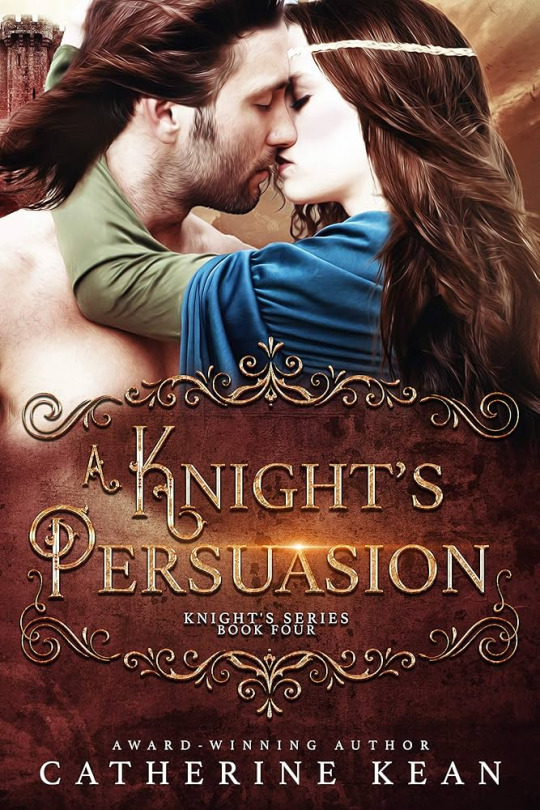
(I'm sorry, Catherine Kean, I have no idea if your books are actually good or not; you're just my unfortunate example.)
Argenti's supposed to come across as weird because he's literally in the wrong genre, but I really do not believe he's supposed to be seen as traditionally feminine.
Boothill, on the other hand, is coming from a cultural tradition (cowboys/the American West) infamous for toxic masculinity--but also, because of that, rife with queer connotations. "Cowboy culture" basically entirely eschews women, who are background figures in Western media at best. Cowboy tales classically center men and only men, examining the complex relationships between them, which lends itself to lots of both intentional (and unintentional) homosexual tension. Brokeback Mountain didn't make so many ripples for no reason. 😂
I'm not a Boothill expert, so I don't have the receipts to show for him having numerous feminine traits to accompany his cowboy masculinity (the pink gun does come to mind though lol), but I think it's important not to forget his role in the story: Boothill is both a man on a mission of vengeance and a victim. In painting him as the sole survivor of his people's massacre, we see the same powerlessness as Aventurine was subjected to--initially, both were helpless victims to the same man, stripped of their right to bodily autonomy (Boothill's lore is a bit of a mess, if I recall, on whether he became a cyborg willingly or not).
Being a victim is obviously not inherently feminine, but the role of "victim" is so often assigned to women in media that it can be read as an emasculating position regardless. Simply put, it isn't manly to be defeated by your enemy and made powerless before him.
Thus, the fact that Boothill has lost everything and has never been able to achieve his vengeance and get back his "power" (thus, symbolically, his masculinity) from his oppressor is always a part of the conversation with this character.
I also feel compelled to note that there was no woman directly involved with Boothill's daughter; he found his daughter as a baby and raised her without any relationship to a woman (except his own adopted mother, Graey)--I think this is actually another point in the favor of Boothill having more feminine traits than Argenti; as shitty as this is, being willing to care for a literal baby is still seen by a lot of people as "women's work."
Anyway, I completely agree with your point that there is a lot of nuance to this issue--frankly, too much for tumblr posts to encapsulate--but I think that there's enough consistency to the design choices on the devs' part that I personally feel we can say Hoyo does have a clear pattern, and that clear pattern largely plays is safe with baiting ships that remain within the boundaries of a heteronormative sphere.
This is only my perspective though, limited as it is by my own frames of reference!
#honkai star rail#so many characters mentioned here...#alhaitham#kaveh#sampo#argenti#boothill#character meta#star answers
52 notes
·
View notes
Text
The more dialogue tidbits I get between Nick Valentine and John Hancock really lines them up well for me. I didn't expect to fall into it because Nick is basically my virtual dad lmao.
But I guess it just makes sense to me that even if they aren't official they've had a thing. Y'know? Like they aren't in a relationship now but I know, I feel it in my soul, they've done stuff in the past.
There's so much I could say but baseline, they've been in the same place for a while before, they clearly know each other when you bring Nick to Goodneighbor. They're both "older" in human terms, Nick moreso than Hancock.
Hancock is much smarter than I think people will credit him for. And considering he took on a double life and renamed himself after John Hancock, it may make Nick feel like he can trust Hancock with his thoughts.
Because in a way, they're both taking on identities as different people. Hancock adopted an identity, and Nick is trying to forge his own path out of the identity he had no choice in living with.
Nick is one of the people who doesn't at all judge Hancock for his ghoulish features. Especially since I think they knew each other before the incident. Hancock is still clever and witty, and enjoys playing detective with his favorite synth.
Also, Nick is a big man. He's at least 6'2 I'm thinking. Synths were originally made to be fighters and bodyguards so even though he's an older model I don't think they skipped out on trying to bring strong/intimidating qualities to his framework.
And I agree with everyone else, Hancock gives short king vibes. He's like 5'6/7 at the most. And who doesn't love a 6'2 man holding his gremlin spawn 5'6 friend with benefits like in the lion king??
#valencock#fallout characters#fallout 4#fallout#nick valentine#Nick Valentine fallout#Nick Valentine Fallout 4#john hancock#john hancock fallout 4#John Hancock fallout
151 notes
·
View notes
Text
Ratonhnhaké:ton: Growth and Autonomy
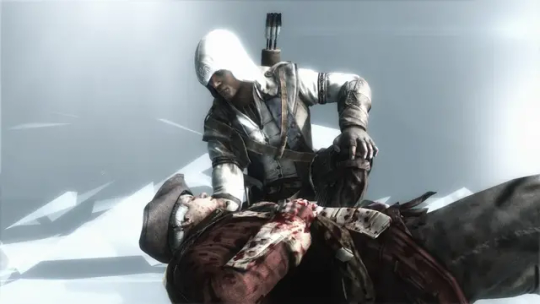
"Connor comes across to me as an incredibly naive character." "People will just tell him someone is a bad guy and he’ll go murder the person, no questions asked. He has almost no autonomy."
While I understand why people within the fandom believe this, these interpretations only overlook critical aspects of Connor’s character. His perceived naivety is not a flaw—it’s an intentional feature of his narrative. Connor begins the story as a young man thrust into a complex, unfamiliar world filled with conflicting beliefs and customs. His arc centers on navigating this chaos and growing into someone who balances idealism with hard-earned wisdom. Far from being a passive or blindly obedient character, Connor demonstrates remarkable autonomy and moral depth throughout his story. Take, for example, his approach to William Johnson. Connor doesn’t immediately kill him when faced with Johnson’s plans to purchase native land. Instead, he undermines Johnson’s efforts through the Boston Tea Party, attempting a peaceful resolution rather than resorting to violence.

Sequence 6: Hostile Negotiations (transcript)
Kanen'tó:kon: William Johnson has returned - with all the money required to buy our land. He meets with the elders as we speak. I have begged them to resist. But I fear he shall have his way unless you intervene. Connor: How is this possible? We destroyed the tea. Achilles: The Templars are nothing if not resourceful. You should have heeded my warning.
Even when circumstances force Connor to kill Johnson, it’s a reluctant act, filled with regret and a deeper understanding of the moral weight of his decision.
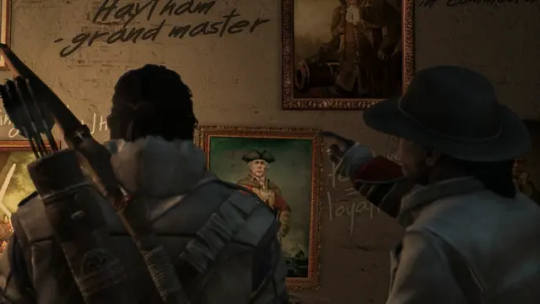
Sequence 7: The Midnight Ride (transcript)
Connor: I thought it might bring clarity. Or instill a sense of accomplishment. But all I feel is regret. Achilles: Hold fast to that. Such sacrifices must never come lightly. Connor: I had to do it. Not only for my people, but for all the others Johnson would have harmed.
This is not the behavior of someone who acts without thought or autonomy. Similarly, his handling of Thomas Hickey reflects his nuanced morality; rather than simply assassinating Hickey, Connor attempts to bring him to justice by exposing his counterfeit operation and putting him in jail. This demonstrates Connor’s preference for justice over killing whenever possible—an uncommon trait among Assassins.

Connor’s journey also includes grappling with the conflict between the Assassins and Templars. He openly considers the possibility of peace and collaboration between the two factions, particularly during his time with Haytham. This introspection and willingness to challenge the status quo are unprecedented for an Assassin. No other protagonist in the series has or since entertained the idea of reconciliation with such sincerity and depth.
Sequence 10: Alternate Methods (transcript)
Connor: But now their hold is weakened, which makes me believe there's a chance for peace. Imagine what might be accomplished if we were to unite. Achilles: Why the change of heart? Where is this coming from? You've met your father, haven't you? Connor: I do not claim to trust the man—or even like him. But I would be remiss to ignore this opportunity. Achilles: Haytham may listen. But will he understand? And even if he does, will he agree? Connor: Even he must admit that we achieve more together than we do alone.
His independence is further showcased in his relationship with Achilles. Connor often defies his mentor, such as when he reveals the truth about the Assassins and Templars to George Washington, acting on his convictions rather than blindly following orders.
Even in his most emotionally charged moments, Connor’s actions are driven by a thoughtful moral framework. After discovering Washington’s role in burning his village, Connor doesn’t abandon the Patriot cause out of bitterness. Instead, he chooses to support their fight one last time—not because they are perfect, but because he believes freedom, despite its flaws, is preferable to the Templars' control.

Sequence 10: Broken Trust (transcript)
Connor: You seem to think I favor him. But my enemy is a notion, not a nation. It is wrong to compel obedience—whether to the British Crown or the Templar Cross.
Connor’s story isn’t about blind loyalty or unchecked naivety. It’s about growth, introspection, and the struggle to uphold one’s values in an imperfect world. His choices reflect a level of autonomy and moral complexity that sets him apart, making him one of the most layered characters in the Assassin’s Creed series.
#assassin's creed#connor kenway#ratonhnhaké:ton#assassin's creed 3#haytham kenway#achilles davenport#george washington#charles lee#william johnson#thomas hickey#moral compass#moral complexity#growth#connor ac3#ac3
58 notes
·
View notes
Note
hey i don't mean to be mean or anything i'm just wondering about that marauders fans post.
how would a marauders fan art benefit jkr? how would a fanfic about gay and trans characters benefit her? i feel like it does her more harm that people think of her characters as queer. and i think most marauders fans already know not to buy her books or go to the wizarding world or watch the new show or whatever.
like when it comes to spending money everyone's careful to not support her except terfs and people support her ideology and whatnot.
i'm trying to think of how someone posting headcanons about these characters on tumblr can somehow benefit jkr
again, i don't want to come across as hateful or anything i'm genuinely trying to understand your point
thank you for asking this in good faith. i've been having trouble wording stuff lately, so apologies if this isn't as coherent as i'd like.
participating in the marauders fandom continues to benefit jkr simply because you cannot divorce the marauders from their larger context. the fandom may have turned the marauders into something more than glorified side characters, but they cannot exist without the framework of the harry potter universe which has bigotry baked into its very core. imagine we're all playing in a sandbox. marauders fans may be making beautiful sand castles and art with their own two hands, but they're using the sand toys that jkr left for them and the sandbox that they're playing in is in her backyard and in order to play you have to get your hand stamped by joanne personally.
it would be so easy for people to just....make their own ocs or switch to a different fandom. the marauders are hardly characters to begin with, but the inability to let go of a text which gives them basically nothing as characters ensures that the bloated corpse of the harry potter fandom continues shambling around long after it should have died.
and for the most part, the marauders are not relevant to normies. i think even if someone was a big fan of the books in middle school, but has moved on, they aren't going to think of the marauders beyond the characters we actually see on page. the prevailing cultural view of those characters in the context of how they were written is not "look at this cool and diverse friend group coming of age in the 70s and sticking it to the man" or w/e it's "those guys who were mostly in the background." most people do not think of these characters as queer because they aren't doing the mental labour of filling in jkr's world for her.
but because this fandom is so popular--it trends every other week, pinterest is filled with it, youtubers are making video essays on marauders fandom as a queer utopian reclamation of hp--jkr sees the continued relevance of people talking about her characters. she does not see the caveat that you are taking this character who is just a name on a page in some supplementary material and making her into a black lesbian (which is a whole other thing where ppl treat diverse headcanons as a "punishment" for bigoted authors in the same way that twitter libs will qtwt homophobes like "i hope your kids turn out to be gay" which is....not activism but anyway). she doesn't see desi james potter and gay trans boy remus lupin, she just sees the interaction between creator and consumer. she sees this as "people still care about the art i have made and must agree with my views". it makes her believe she still has an audience, which she definitely does unfortunately, which is why we're getting the series reboot and theme parks and merchandise for a piece of ip that peaked what? 15 years ago? i'm not looking that up
tl,dr in jkr's brain support of her work = support of her views
38 notes
·
View notes
Text
Since I've spent the last month-plus neck-deep in queer Christian history research, I ended up with some thoughts™️ about "classical" Western homoeroticism vs. Christian homophobia.
Liberal Christian apologetics sometimes do a very annoying thing when asked to explain the homophobia in the New Testament epistles. Because it's real, it's there, and homophobic Christians take it as the Unquestionable Word of God. So obviously we have to do something about it.
The liberal explanation tends to go something like this: "the epistle writer is talking about the abusive and exploitative homosexual acts that were common in ancient Rome, not the loving/egalitarian/mutually respectful relationships that gay people are able to have today." And it's so frustrating because there is SOME truth in this. We and Paul both know that the Greeks and Romans were notorious pederasts and slave-abusers. And that's bad! It's super bad. I do agree that Paul/the epistle writer is condemning abusive behavior using language and frameworks that would have been available to him at the time. Deciphering the social context of the epistles can get messy.
But the annoying thing is this: it is not affirming to suggest that all gay people in the past were either abusers or their victims, and "we're more enlightened now" is a lie. We are not smarter than the Greeks. We are not more civilized than the Romans. We are not more pious than the medievals. (Hello there, Roman Catholic sex abuse scandals.) And there have always been gay people who have defied all odds to have loving, egalitarian, and mutually respectful relationships with each other, even if we do not know their stories or their struggles.
This is kind of the crux of John Boswell's "controversial" thesis: gay people have always existed, even if they had to conceal themselves and their relationships behind various protective structures. (I actually haven't read any of his books yet, so I'm not going to engage too deeply with the nuances of his arguments.) When people try to dismiss him, I suspect it's because they don't notice or appreciate what he probably noticed. I have a hunch that Boswell's arguments are not super intersectional and focus mostly on the privileged sphere of people who left written records in the Middle Ages, but hey, serious LGBTQ Christian history research has to start somewhere. I'll withhold judgment for now. But I do think he was totally right about one thing: Saints Sergius and Bacchus. They were totally a gay couple until somehow proven otherwise, IMO. The reason I think he was right is because he was able to notice the "classical" aesthetics of homoeroticism in their legend even though it might not obvious to people who don't know what they're looking for. Straight people reading the legend are like "there's nothing gay about this" and gay people are like "wow, this story is pretty gay."
If you've ever looked into Western gay history, you've seen two words: erastes and eromenos. This means "lover" and "beloved," the two sides of a classical Greek pederastic relationship. The Greeks did actually recognize an age of consent and had ideals of proper behavior that regulated these relationships, but these were still usually relationships between a teenage boy and an older man, which isn't great. They also had all kinds of weird ideas about the politics of penetration and so forth. The Greeks and Romans didn't really think that two people could really be equal to each other--in any relationship, there was always one who was sort of subordinate to the other. So it was "weird" for two social equals to be in a gay relationship, as opposed to one with one partner who was already "established" and was "showing the ropes" to a younger guy who needed some wholesome manly instruction. We may not be better, smarter, or more enlightened than people in the past, but we do have the ability to critique them and try to identify the harmful behaviors that we've inherited from them, so we can do better. We've come a long way since the days of erastes/eromenos relationships, but one thing has stuck around: the classical aesthetics of a "manly guy" and an "idealized youth" in love with each other.
Apropos of nothing, here's a photo of John Boswell and his longtime partner Jerry Hart. They were within a year of being the same age.
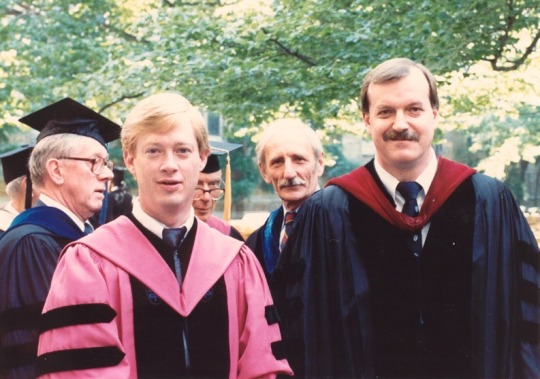
So anyway, this brings us back to the legend of Sergius and Bacchus. The version that Boswell translated takes great pains to show how Sergius and Bacchus were equals in every way. They're both Roman officers, they're about the same age, they sing in unison, and are united in the egalitarian love of Christ. However, they are still just a little bit unequal. Sergius is of a slightly higher rank than Bacchus.
To be clear, this whole legend is a literary creation, and it's got a bunch of Byzantine propaganda in it. It's not history, it's mythology. Whoever wrote it down would have been familiar with erastes/eromenos dynamics, because these were everywhere in classical antiquity. So they made sure to specify all the ways in which Sergius and Bacchus were equals, but took a firm position in ye olde fandom top/bottom discourse.
Throughout the legend, Sergius acts, and Bacchus is acted upon. Bacchus is killed first, and Sergius is temporarily demoralized. Bacchus then appears to Sergius in a vision encouraging him to stay strong. Sergius is so steadfast that they can't torture him enough to make him recant his faith, and he is beheaded. Even straight couples are not usually said to have been reunited in heaven, but Sergius and Bacchus are.
So, knowing that Sergius is the erastes and Bacchus is the eromenos in this story, we can start to notice it in iconography too. It's not always consistent, but sometimes icons will have Sergius' cloak curling protectively over Bacchus' head, or one of them taking a slightly more "authoritative" posture, etc.
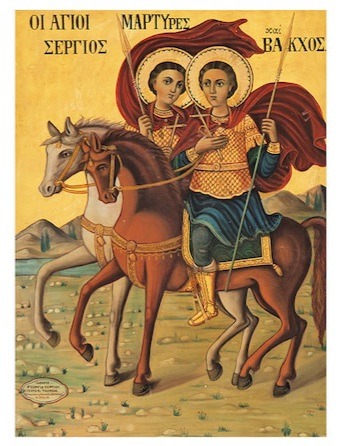
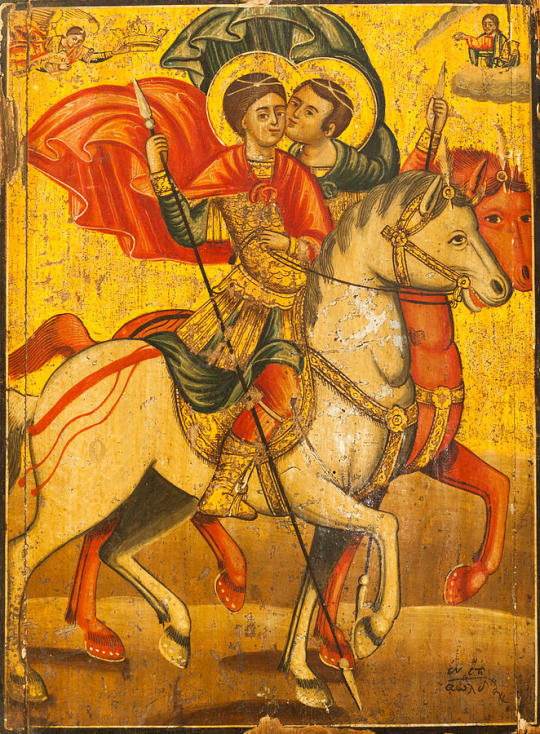
Above all, they are always depicted as true equals--sometimes they almost look like twins.
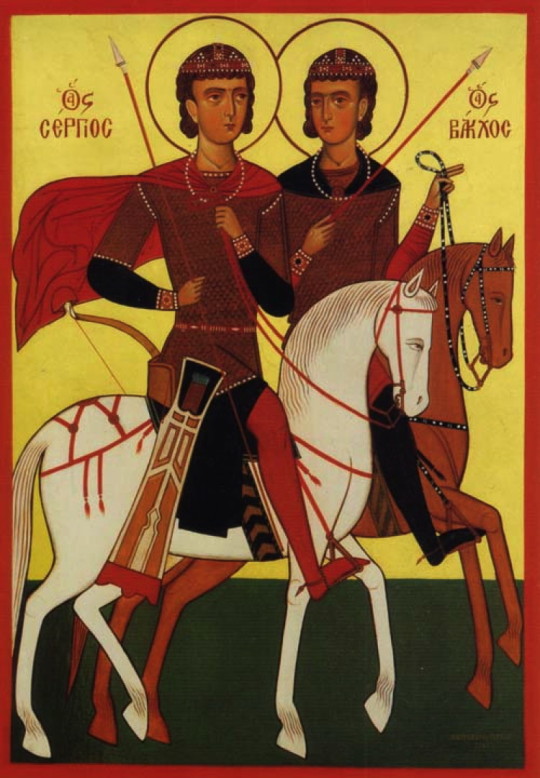
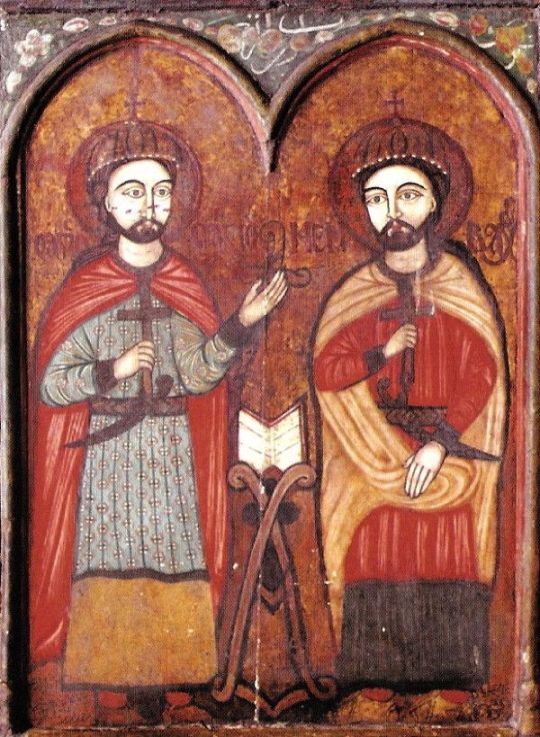
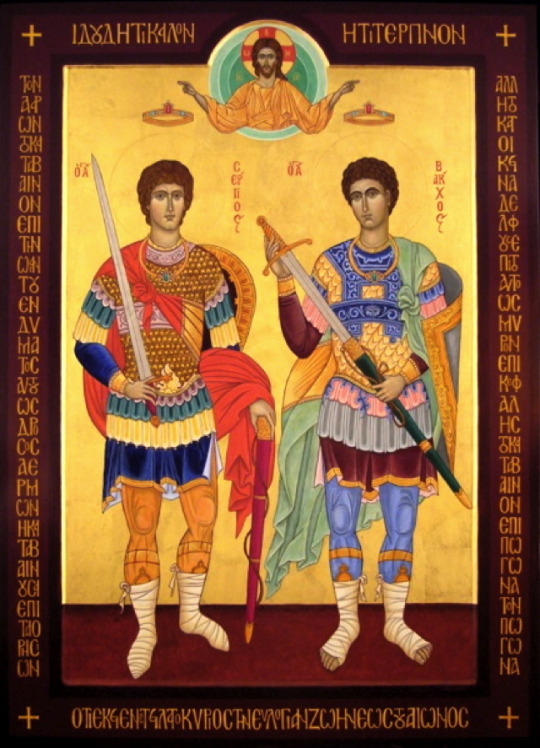
Increasingly, modern icons are being made that explicitly communicate the idea that they were a gay couple. The one on the left was created by Robert Lentz, a Franciscan friar, for Chicago Pride in 1994. The one on the right makes the classical homoerotic aesthetic super explicit, and is by far the most sexually-suggestive "traditional-style" icon I have ever seen lol. Shoutout to this artist.
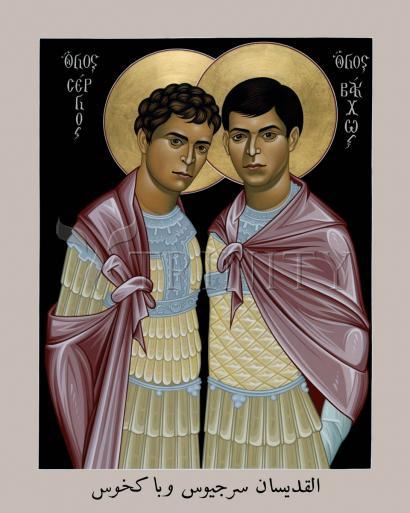
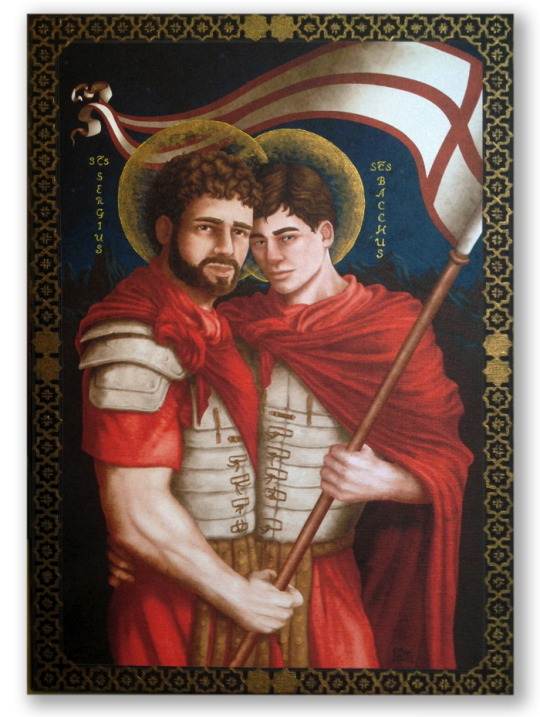
So to sum up: John Boswell knew what the fuck he was talking about. Also, none of this excuses the homophobia in the Christian scriptures or the homophobia that Christians continue to perpetuate. However, knowing what to look for in art and writing helps us understand that gay people were not magically granted the ability to have egalitarian relationships in the modern world, and THAT leads us away from problematic apologetics.
857 notes
·
View notes